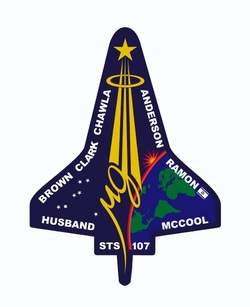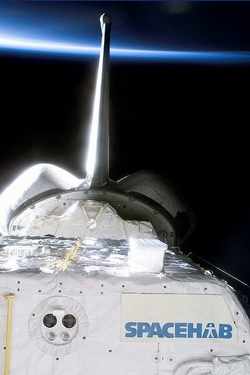Fri, 17 Jan 2003, STS-107 MCC Status Report #03
 In their first full day in orbit,
Columbia’s seven crewmembers completed activation of
the SPACEHAB Research Double Module in the shuttle’s cargo
bay and all of its scientific experiments. Red Team members
Commander Rick Husband, Mission Specialists Kalpana Chawla and
Laurel Clark and Israeli Payload Specialist Ilan Ramon were
awakened at 4:39 a.m. CST. Following a handover with their Blue
Team counterparts, they took over for Pilot Willie McCool and
Mission Specialists Dave Brown and Mike Anderson, who began an
eight-hour sleep period at 10:39 a.m. CST.
In their first full day in orbit,
Columbia’s seven crewmembers completed activation of
the SPACEHAB Research Double Module in the shuttle’s cargo
bay and all of its scientific experiments. Red Team members
Commander Rick Husband, Mission Specialists Kalpana Chawla and
Laurel Clark and Israeli Payload Specialist Ilan Ramon were
awakened at 4:39 a.m. CST. Following a handover with their Blue
Team counterparts, they took over for Pilot Willie McCool and
Mission Specialists Dave Brown and Mike Anderson, who began an
eight-hour sleep period at 10:39 a.m. CST.
All SPACEHAB payloads are performing well and research
activities continue on schedule. Specific experiment highlights so
far include:
All Fast Reaction Experiments Enabling Science Technology
Applications and Research, or FREESTAR, payloads have been
activated and are performing well. One FREESTAR experiment that
measures the amount of energy coming from the sun completed an
initial observation, with the best sun pointing ever seen on any
shuttle flight. Another experiment that will perform measurements
of the Earth’s ozone layer is operating nominally. The
Mediterranean Israeli Dust Experiment, or MEIDEX, which will
measure small particles called aerosols in the atmosphere over the
Mediterranean Sea and the Atlantic Ocean off the coast of the
Sahara desert, has been readied for initial observations.
 The Bioreactor Demonstration System made its
initial run. The NASA-developed bioreactor is being used to grow
prostate cancer tissues to help scientists better understand how
the cancer spreads into bones and to aid in the development of
future treatment methods. In the first 20 hours of experiment
operations, a significant aggregate of tumor tissue was grown.
The Bioreactor Demonstration System made its
initial run. The NASA-developed bioreactor is being used to grow
prostate cancer tissues to help scientists better understand how
the cancer spreads into bones and to aid in the development of
future treatment methods. In the first 20 hours of experiment
operations, a significant aggregate of tumor tissue was grown.
The Critical Viscosity of Xenon-2 experiment has been working
nominally. The instrument is cooling the xenon sample to begin
calibration. A preliminary analysis of the flight data compares
favorably with ground-based data. This research in fluid physics
may be important to the production of paints, plastics, drugs, food
and cosmetics.
The Blue Team will be awakened at 6:39 p.m. CST to continue work
on the more than 80 experiments aboard Columbia. Scheduled
activities include using MEIDEX, consisting of a radiometric camera
and a video camera, to measure a Mediterranean dust plume north of
the Gulf of Sidra. Human life sciences experiments also are
scheduled to begin.
All systems aboard Columbia continue to function well.
Aboard the International Space Station, Expedition 6 Commander
Ken Bowersox, Flight Engineer Nikolai Budarin and NASA ISS Science
Officer Don Pettit completed their eighth week in space. Today,
they unstowed a rendezvous system from the Russian Progress 9
resupply ship in preparation for the Progress’ undocking
February 1. That will clear the aft port of the Zvezda Service
Module for the arrival of a new Progress cargo craft February
4.
The Expedition 6 crew also conducted metabolic science
experiments, exercised and prepared for a quiet weekend in
orbit.
 A Crazy Tesla Flying Car is Coming
A Crazy Tesla Flying Car is Coming ANN's Daily Aero-Term (11.xx.25): NonApproach Control Tower
ANN's Daily Aero-Term (11.xx.25): NonApproach Control Tower Aero-News: Quote of the Day (11.01.25)
Aero-News: Quote of the Day (11.01.25) ANN's Daily Aero-Linx (11.01.25)
ANN's Daily Aero-Linx (11.01.25) Classic Aero-TV: EAA Introduces Angle of Attack Training
Classic Aero-TV: EAA Introduces Angle of Attack Training




